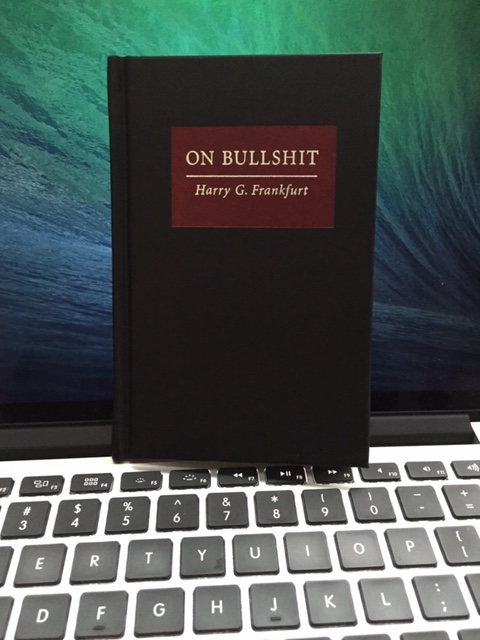Harry G. Frankfurt’s “On Bullshit” — A Review
 Liars lie. Bullshitters prattle on heedless of whether or not they lie. That’s what I learned from the only philosophical treatise ever published on bullshit.
Liars lie. Bullshitters prattle on heedless of whether or not they lie. That’s what I learned from the only philosophical treatise ever published on bullshit.
In 1986, the philosopher Harry G Frankfurt wrote an essay titled “On Bullshit.” In 2005 he published it as a very small book. On Bullshit, Princeton University Press edition, became a New York Times bestseller despite being only 67 pages long with the approximate dimensions of an iPhone 6 Plus.
I should hate this book. Like nearly all philosophical essays, “On Bullshit” is neither clear nor brief, and most of it is boring. Even so, I’m fond of Prof. Frankfurt’s little book. He and I share a conviction that bullshit is worthy of study. His essay starts, “One of the most salient features of our culture is that there is so much bullshit.” You ain’t kidding, professor.
I was enchanted by Frankfurt’s description of the distinction between lying and bullshitting. The liar is trying to fool you. The bullshitter doesn’t care about truth, just about the impression he is making:
This is the crux of the distinction between [the bullshitter] and the liar. Both he and the liar represent themselves falsely as endeavoring to communicate the truth. . . .But the fact about himself that the liar hides is that he is attempting to lead us away from a correct apprehension of reality. . . . The fact about himself that the bullshitter hides, on the other hand, is that the truth-values of his statements are of no central interest to him . . . his intention is neither to report the truth nor to conceal it. . . . unconcerned with how the things about which he speaks truly are.
Frankfurt also incisively addresses my favorite question, as to the cause of bullshit:
Why is there so much bullshit? . . . There is more communication of all kinds in our time than ever before . . . [How much more true this is 29 years later!] . . . Bullshit is unavoidable whenever circumstances require someone to talk without knowing what he is talking about. Thus the production of bullshit is stimulated whenever a person’s obligations or opportunities to speak about some topic are more excessive than his knowledge of the facts that are relevant to that topic.
My job is to slog through blobs of prose for you; this book is no exception. I owe you a summary.
Short version: Bullshit is everywhere, because people must create prose about things they don’t actually understand. The bullshitter is dangerous, not because he is lying, but because he doesn’t care about truth.
Unlike the bullshitter, I do care about the truth.
Help me out. Tell me about your struggles with bullshit. Contact me at josh at bernoff dotcom.
Dear Josh,
I’ve always enjoyed your research, analysis , projections on interactivity, convergence , future of TV , mobile …etc when you were at Forrester, when I invited you as Keynote in Montreal for ‘M.I.M’ and now with ‘ Bullshit’ you are still enlightning us with your thought provoking ideas yet so true!
I enjoyed the diverse topic of everyday Bullshit its interconnected with everything we do in society. The use of coloring the descriptive topic of Bullshit it amazing what I would think of colorful language is just Lying.
The difference between a sea-story, and the truth
Is that a sea-story always begins with, “Now this
Is no bullshit!”
” The bullshitter doesn’t care about truth, just about the impression he is making:” You failed to explain, or at least touch on the notion that the bullshitter cares about the impression he is making. Why does the Bullshitter care? I think that is the core to Bullshitting. The impression they make. The impression they make is not a matter of frivolity, but a matter of identity. This is the compelling driving force behind Bullshit of all sorts. It is part and parcel of the ‘Identitarians’ rasion d’etre. Literally! It’s displayed in the infantile demand that everyone use [bow] to a person’s chosen pronouns, eg. We are awash in a sea of Bullshit.